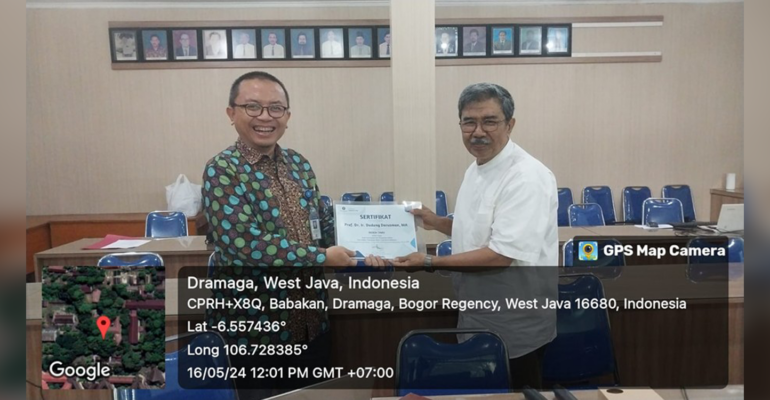IPB University’s Forest Management Study Programme Outlines the Vital Role of Forest Businesses in Maintaining Sustainable Forest Ecosystems

Department of Forest Management, Faculty of Forestry and Environment (Fahutan) IPB University held a public lecture ‘Business Management of Forestry Small Businesses’ in a hybrid manner, Thursday (16/5). The public lecture which was intended for Master and Doctoral students of the Forest Management Science Study Programme of IPB University also presented a guest lecturer, Prof Dudung Darusman.
IPB University’s Forest Management lecturer, Dr Bahruni began his presentation by describing the role of forest concessions. He said that forest exploitation plays a vital role in creating human welfare and maintaining a sustainable forest ecosystem. Without efficient exploitation, sustainability in the utilisation of forest resources is threatened.
“Forest entrepreneurs act as agents of development, building welfare, strength and independence in the surrounding community,” he explained.
According to him, business opportunities in forestry are vast, covering all stages from forest management to final products. The production process of forest ecosystems also has its own characteristics, with a variety of products and specific harvest locations.
“Micro, small and medium scale enterprises (MSMEs) play an important role in building a stable and sustainable local economy. Business networks, both local and national, help enlarge business scale, improve product quality, and expand market access,” Dr Bahruni explained.
In choosing a forestry business, consideration of resource potential, market opportunities and product characteristics is key.
The early stages of a venture will offer challenges, but also opportunities for learning and innovation that can lead to long-term success.
“The culture within the company is the main focus in building efficiency and prosperity in this era. Turning efficiency into a habit not only makes business processes more cost-effective and productive,” he explained.
Therefore, he added that in this culture, market players and leaders must have a deep understanding of business and market economics. They must also have the courage to take efficient steps in managing the business.
Prof Dudung Darusman in this public lecture explained that the dynamics of corporate culture demand continuous adaptation in accordance with the conditions of society and external challenges. The progress of corporate culture can be seen from the shift from an order-based model to a knowledge-based model. This provides space for innovation, collaboration, and shared success.
However, he continued, there are still challenges in changing the old culture that hinders productivity, such as excessive individualism, seeking personal gain without considering the end result, and a lifestyle oriented towards competition rather than cooperation.
“Therefore, a new culture that is more inclusive, oriented towards collective results, and sharing resources is the key to facing challenges and building a better future,” Prof Dudung explained. (*/Rz) (IAAS/RUM)



